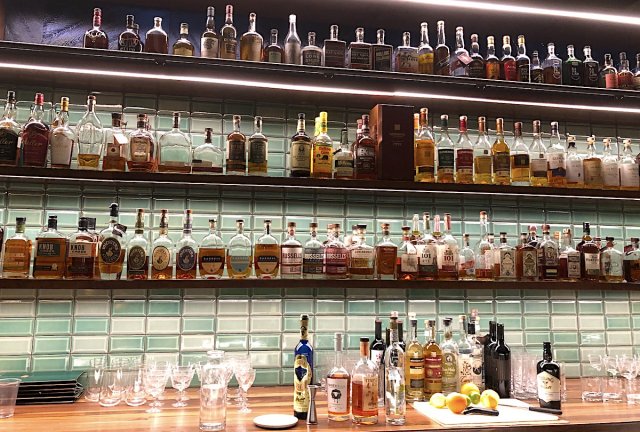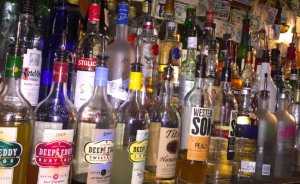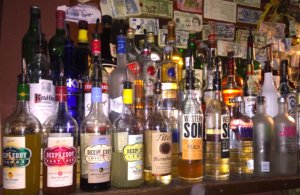
While the Legislature may pass a state statute that conflicts with language in the Oklahoma Constitution, the state court system shall overturn the conflicting statute.
In a 5-4 decision concerning the difference between “may” and “shall,” the Oklahoma Supreme Court this morning upheld a district court ruling that SB 608 — a controversial bill to re-expand distributor access to top wine and liquor brands — violated the state’s constitution.
“SB 608 is clearly, palpably, and plainly inconsistent with Article 28A, Section 2(A)(2)‘s grant of discretion to a liquor or wine manufacturer to determine what wholesaler sells its product,” wrote Supreme Court Justice James Winchester.
Winchester, Chief Justice Noma Gurich Vice Chief Justice Richard Darby, Justice James Edmondson and retired Justice John Reif upheld the previous ruling of Oklahoma County District Court Judge Thomas Prince, who found SB 608 unconstitutional.
Passed last session, the bill carried by Rep. Chris Kannady (R-OKC) and Sen. Kim David (R-Porter) required wine and spirit manufacturers to sell the 25 most popular brands in Oklahoma to any qualified distributor.
The bill caused consternation among lawmakers related to political donations from Bryan Hendershot, the proprietor of Tulsa-based Boardwalk Distribution. The resultant liquor bicker divided Republican caucuses and featured competing allegations of ethical violations.
‘The clear and ordinary language’
In his majority opinion, Winchester broke down how the Oklahoma Constitution previously said wine and spirit manufacturers “shall” sell to any qualified wholesaler or distributor. In 2016, the justice noted, Oklahoma voters changed their constitution to say those manufacturers “may” sell their product to any distributor they choose.
“This court must interpret constitutional provisions in conformity with their ordinary significance in the English language — given their commonly accepted and nontechnical meaning,” Winchester wrote. “The clear and ordinary language of Article 28A, Section 2(A)(2) allows a liquor or wine manufacturer to select one or more than one wholesaler to distribute its product.”
Winchester also summarized the events leading up to SB 608:
After passage of State Question 792, Oklahoma’s two largest wholesalers, Central Liquor and Jarboe Sales Company, each sold 49 percent of their respective businesses to the two largest national alcohol distributors, Southern Glazer’s Wine & Spirits and Republic National Distribution Co. As a result, these two wholesalers — now known as Appellees Southern Glazer’s Wine and Spirits of Oklahoma, LLLP and Central Liquor Co. L.P., d/b/a RNDC Oklahoma — obtained exclusive distribution contracts with the majority of liquor and wine manufacturers, including distribution of the top 25 brands at issue here. The two largest wholesalers controlled the majority of all wholesale distribution in Oklahoma when Article 281A went into effect on Oct. 1, 2018.
Intervenor/Appellant Bryan Hendershot, owner of Oklahoma’s third-largest wholesaler, Boardwalk Distribution Company, and other wholesalers and liquor stores, advocated for a change to the statutory scheme. The Legislature took up what became SB 608.
‘The whole thing has been smoke and mirrors’
After Wednesday’s decision, opponents and proponents of SB 608 had differing reactions.
“From the beginning, the Institute for Responsible Alcohol Policy has said a statute cannot overrule voter-approved constitutional reforms,” IRAP President John Maisch said in a statement. “We are happy the Supreme Court agreed with the District Court, defended the voice of the people and put this issue to rest. Our members continue to work with retailers across Oklahoma to provide the service and products customers demand.”
Maisch’s group was lead plaintiff in the suit challenging SB 608 and represents the two conglomerates described by Winchester above, including Central Liquor (RNDC Oklahoma). Justin Naifeh serves as that company’s general manager.
“The courts just validated what we have felt this whole time, and we are obviously pleased,” Naifeh said. “But that being said, it’s time to get back to work.”
RELATED
Liquor bicker: Senate sends SB 608 to Gov. Kevin Stitt by Tres Savage
While Naifeh is “pleased,” Boardwalk Distribution owner Bryan Hendershot is not.
“Obviously, we are unhappy with it,” Hendershot said. “But based on the hearing, we probably suspected it would come out this way.”
Hendershot said he worked with liquor stores to lead the SB 608 effort owing to decreased availability of top brands for some bars and restaurants. He said the problem originated from the legislatively proposed SQ 792, which switched “shall” to “may” to subtly and surreptitiously create a wine and spirit distribution duopoly.
“What it boiled down to was the Naifeh family was just better at legislation at that time. It’s sad that legislators sometimes don’t pay attention to what is being passed. That is language that was slid in,” Hendershot said. “The whole thing has been smoke and mirrors. They stand up and say, ‘The people voted for that.’ But I’ve stomped my foot a million times (because) you can ask 90 percent of the legislators out there (and) once they found out that language was in there, they weren’t a fan of it, and that’s why they were supporters of SB 608.”
Hendershot said his company grew at a rapid rate leading up to the 2016 state question but fell from $150 million of revenue in 2018 to about $39 million in 2019.
“We didn’t even know until the last second that this language was getting slipped in there,” Hendershot said of the legislation proposing SQ 792. “That’s what I’ve always been pissed about.”
Hendershot said the Supreme Court’s ruling ensured a market with limited competition that will allow the two largest distributors to raise the various fees charged on bottles and cases of wine and liquor.
RELATED
Duopoly or pro-business? Shots taken in liquor distribution fight by Tres Savage
While he believes the Legislature is probably tired of the topic heading into the 2020 session, Hendershot said other efforts — such as a constitutional change — could be considered in the future.
“We’re kicking tires on everything. I would love to see the Ethics Commission get involved on things like this to see who put this language in there,” Hendershot said. “Someone didn’t magically make up this little sentence to throw in there and turn the distribution business upside down. So that’s what I want to get to the bottom of: Why?”
‘Let’s see what games are being played’
Hendershot defended his broad campaign donations during the 2019 session and said the Naifeh and Jarboe families have made their own extensive political contributions.
“I realized by getting screwed on the modernization law that you need to be involved,” Hendershot said. “They tried every tactic in the book to make us look bad.”
Asked if he thought those tactics included rumored complaints to the FBI, Hendershot said he has not been interviewed by any law enforcement entity.
“Yeah, I heard that rumor,” he said. “Let the FBI get involved in what went on. Let’s see what games are being played. At the end of the day, how did (then-Sen.) Clark Jolley and Sen. (Stephanie) Bice put that language in a bill when nobody (other than the larger distributors) wanted it?”
Bice, who is seeking the Republican nomination for Oklahoma’s 5th Congressional District, released a statement following the court’s decision.
“I’ve felt from the beginning that this legislation was unconstitutional, and I’m relieved to hear that the Supreme Court confirmed that with a ruling today,” Bice said. “SQ 792 was very clear in outlining distribution for alcohol moving forward, and this legislation took a step backward and moved the process to how it was prior to October 2018.”
Jolley, who is now a member of the Oklahoma Tax Commission, said SQ 792’s change of “shall” to “may” was intentionally done to end industry protectionism.
“We looked at trying to move Oklahoma’s alcohol industry to the free market and away from a protectionist market that benefited the middle man to the detriment to the consumer,” Jolley said. “It’s absolutely not a free market if you’re being forced to sell your product to someone regardless of how they are going to treat your product, store your product or market your product. If you’re being forced to use those people against your will, that’s not free market by any stretch.”
Kannady, the House author of SB 608, disagreed with the court decision.
“It’s obvious that it’s still a contentious issue since the court is divided,” Kannady said. “It’s not the first time I’ve disagreed with the court, and it probably won’t be the last.”
Asked if he thought political drama surrounding SB 608 had spurred the FBI to look into how political contributions are made and how legislative business is conducted in Oklahoma, Kannady said he believes the FBI was looking at proposed legislation that he was not involved with.
“I’m not going to comment on that. I’m not worried about it,” Kannady said. “And I don’t think that was the only thing that was tied to. There were other issues and bills that I had nothing to do with that were tied into that.”
Kannady is the first person to discuss the FBI’s investigation on the record. Others have discussed the matter on background with NonDoc.
Asked what he thought might happen moving forward on the topic of alcohol laws, Kannady said he is unsure.
“We’ve been dealing with alcohol laws since prohibition, so there are always going to be issues to consider,” Kannady said. “I don’t know where it goes from here.”
Read the SB 608 court majority decision
